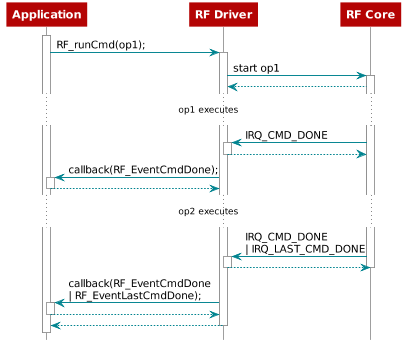Conditional execution and chaining¶
Multiple radio operations can be chained and the chains are executed according to a result from the execution phase. The parameters are specified as follows:
struct RF_Op {
// ...
RF_Op* pNextOp; // Pointer to the next chained operation to run.
struct {
uint8_t rule:4; // Condition for running next command: Rule for how to proceed.
uint8_t nSkip:4; // Parameter for skipping mode if the rule involves skipping.
// 0: repeat same command, 1: go to next, 2: skip next, ...
} condition;
// ...
};
The execution phase of a radio operation always ends with a result that can be
either TRUE, FALSE or ABORT and is specific for every operation.
This result is evaluated together with condition.rule of the radio
operation. All available rules are listet in
Table 3..
| Number | Identifier | Description |
|---|---|---|
| 0 | COND_ALWAYS | Always run next command (except in case of Abort). |
| 1 | COND_NEVER | Never run next command. |
| 2 | COND_STOP_ON_FALSE | Proceed with next command if this command finishes with result TRUE. Stop execution if FALSE. |
| 3 | COND_STOP_ON_TRUE | Proceed with next command if this command finishes with result FALSE. Stop execution if TRUE. |
| 4 | COND_SKIP_ON_FALSE | Proceed with next command if this command finishes with result TRUE. Go to skipping mode if FALSE. |
| 5 | COND_SKIP_ON_TRUE | Go to skipping mode if this command finishes with result TRUE. Proceed with next command if FALSE. |
Based on the evaluation outcome, another command may be started which is
specified by pNextOp and condition.nSkip. The latter parameter allows
for instance, to re-run the command when set to 0 or to go to the next command
when set to 1. It is even possible to jump to a command further in the chain
when greater than 1. In this case, the status of the skipped operation is set
to SKIPPED.
![@startuml
scale 0.8
:Evaluating entry;
if (result) then (TRUE/FALSE)
:next := evaluate(command, result)]
if (next) then (is set)
:start(next)]
else (NULL)
:RF_EventLastCmdDone>
endif
else (ABORT)
:RF_EventLastCmdDone>
endif
:RF_EventCmdDone>
:Evaluating exit;
@enduml](../_images/plantuml-4dcce038b26a293b68d55cfc327253d2a44f7a90.png)
Figure 14. SDL diagram of the Evaluating phase that was shown in Figure 13..¶
The generic part of the evaluating phase is illustrated in
Figure 14.. The pseudo function
evaluate(command, result) depends on the condition rule and skip count and
returns a pointer to the next radio operation. It is specified in
Listing 1. below. The start(next) pseudo function
just brings the next operation into the state PENDING.
RF_Op* evaluate(RF_OP* cmd, bool result)
RF_Op* next = NULL
select (cmd.condition.rule)
case COND_ALWAYS
next = cmd.pNextOp
case COND_NEVER
next = NULL
case COND_STOP_ON_FALSE
if (result == false)
next = NULL
else
next = cmd.pNextOp
case COND_STOP_ON_TRUE
if (result == true)
next = NULL
else
next = cmd.pNextOp
case COND_SKIP_ON_FALSE
if (result == false)
next = cmd
for i = 0 to cmd.condition.nSkip do
next = cmd.pNextOp
else
next = cmd.pNextOp
case COND_SKIP_ON_TRUE
if (result == true)
next = cmd
for i = 0 to cmd.condition.nSkip do
next = cmd.pNextOp
else
next = cmd.pNextOp
return next
For every finished command, a RF core interrupt is raised which results in a RF_EventCmdDone callback event from the RF driver. In addition, the RF_EventLastCmdDone event is only generated:
- for single commands
- for the the last command in a chain
- when the execution result is
ABORT.
This is illustrated in the below sequence chart
Figure 15. for two chained operations op1 and
op2. Only the first operation op1 is delivered to the RF driver using
either RF_postCmd() or RF_runCmd(). The RF core
then executes these operations and generates a callback event
RF_EventCmdDone for both and
RF_EventLastCmdDone only for the last operation op2.

Figure 15. The callback events RF_EventCmdDone and
RF_EventLastCmdDone for two chained RF
operations op1 and op2.¶
